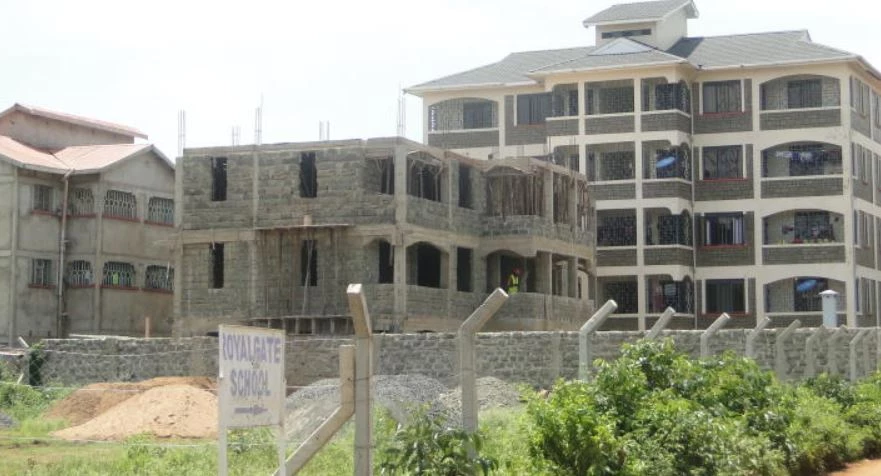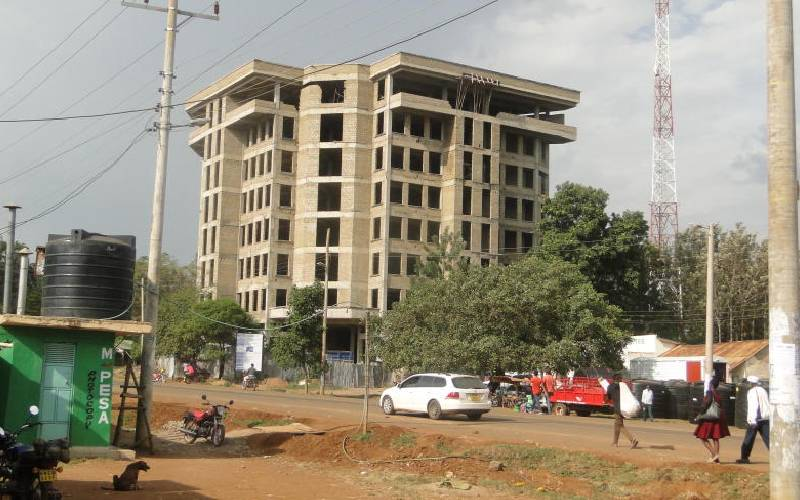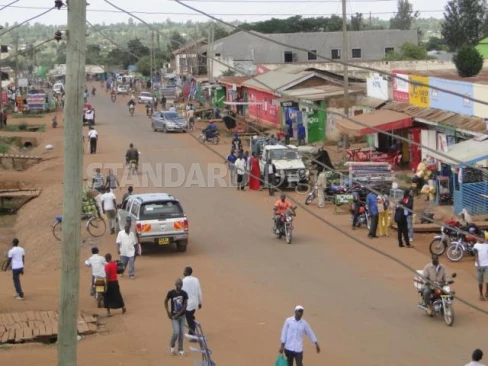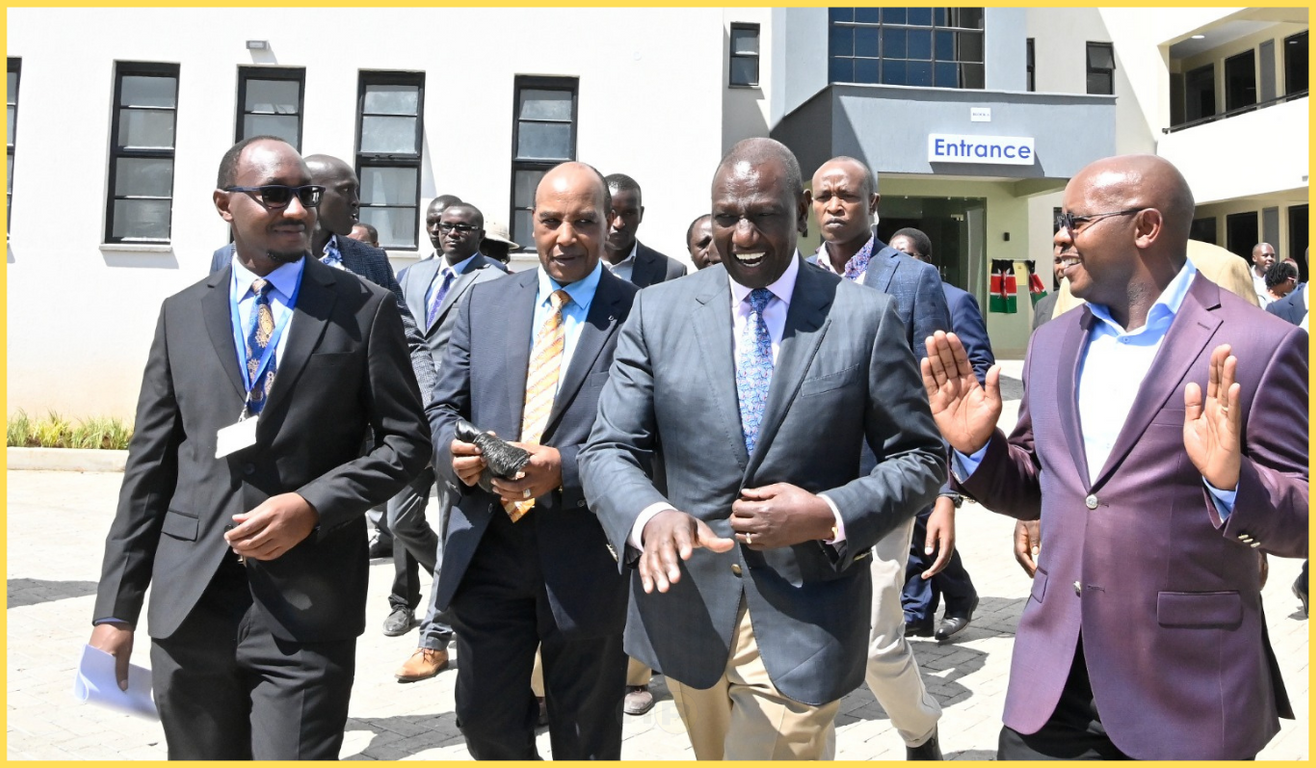Kenyans are outraged with Ruto’s plans to forcefully deduct their salaries for some imaginary housing project. Ruto is going to face demonstrations and rallies against his housing scam from all workers in Kenya in every part of the country.
Right now a teachers’ union has called for a peaceful demonstration on Tuesday to protest over the government’s proposed housing levy.
The Kenya Union of Post Primary education teachers (KUPPET) Mombasa branch says it will commence the one-hour procession from Pembe za Ndovu to Treasury Square, from 9 am to 10 am.
“The teachers of Mombasa intend to hold a peaceful demonstration on the date mentioned against the housing levy as proposed in the finance bill, 2023,” reads the notice dated May 19, signed by the branch executive secretary Lynette Kamadi.
“If you earn Sh10,000, then three percent is Sh300 every month,” Ruto said on April 23.

“We are planning to build 200,000 houses every year. Those houses will create job opportunities for at least one to two million youth.”
“The proposed 3% is not from the entire salary, but rather from the basic salary. And this money is not taxed. You are only giving us your money for a period of time to help create more job opportunities by initiating these projects. It is a win-win situation,” said the Head of State.
“What we are saying is you give us 3% and your employer gives us another 3%, and this is your money. The money is no longer with your employer. We will use that money to build affordable houses for the common mwananchi.”
Like everything else Ruto has done since coming to power this is cooking food on the run with no jiko, no real food to cook and you are just flipping hot air. Nobody eats that but Ruto wouldn’t know anything about that.
Ruto has owned homes and houses since he left college (Nairobi University) almost at the same time as some of us thirty years ago. Ruto left college and became Moi’s boy right away and instantly became a rich man and he has gotten richer by the day since then.
In my case, after college, it was a slightly different story. I leave college in 1984 and get two job offers. I was offered a job to join the Auditor General’s Office. I was also offered a job by the TSC to be an Accounting lecturer at the then-Mombasa Polytechnic. I chose the teaching job in Mombasa.
The first day I get paid my mother is in town having come all the way from our home. She tells me she wants me to buy mabatis to build her house at home. I tell her it is cheaper for me to come home and buy the mabatis from Kisumu. She didn’t even bother to listen to me. She wants the mabatis case closed and she is going to build the house at home.
So we bought the mabatis in Mombasa and she put them on the train to Kisumu and from there, my mother transported them home and I come home a few months later and they have already built a beautiful house for the whole family. They have some really nice family pictures on the wall and I am saying what a great place to be. It would never have happened without my mother.
Does Kenya have a housing crisis? Yes, we do. How can we solve that problem? It looks simple to me from my own personal experiences. Let Kenyans build their homes and houses and the government as well as the NGOs like Habitat can be of great help in that process.
My experience with my mother in building a house for the family tells me one thing. Kenyans can build their own houses by themselves if they have the resources.
Look at this slum mess in Nairobi. Can the Ruto fake housing scheme sort this out? No. But if you give the people who have lived in these hovels for decades a chance to build real houses there, they would do a magnificent job of that.
The real issue is who owns the land where the slums are. If the slum dwellers are given the right, opportunity, and resources.

Let’s face the truth. The first solution to urban slum industry and lack of housing for Kenyans is on who owns the land where the slum is.
If the Kenyan government can formulate a law and a process where the slum dwellers as they are called can build houses on those slum sites they live that could be a big game-changer in the housing problem in Kenya.
I used to live at the Railway Training School in Nairobi (RATASA) in my aunt’s house and next to us was Mkuru Kwa Njenga slums just across the river.
One thing is obvious. These slums will be wrecked homes for Kenyans for generations to come. The other great alternative is to give these sum dwellers an opportunity to build their own houses and homes on the slums they live in. They can do it very brilliantly if they are offered support in terms of building materials. Kenyans know how to build houses and the government’s job should be how to give them the opportunity to do that.
Who the heck owns the slum lands all over Kenya? Can the Kenya government work with them to free the land and let the slum dwellers build houses where they already live and have lived for decades? Those people would build amazing houses there for themselves and for the country. Who is against this?
In terms of housing in small towns which has great opportunities, my sister told me to shut up. She is building some stuff for the family and she said they need infrastructure to make the housing workable.

From my experience in building homes and house in Kenya, I would say what Kenyans need is access to building materials. The bricks are no problem because Kenyans will make them on the ground. Cement is really expensive because it comes with transport costs.
Mabati is a nightmare and now they have the red mabatis. Why can’t Kenyan communities have their own mabati processing plants?
My sister has built houses in Sinapanga in Bondo Town. I ask her why she doesn’t build houses in our land on the upside from Sinapanga where we have ancestral land. She tells me there is no transport system there for motorbikes and cars.
Nobody is going to live there she tells me. That makes me really mad. She doesn’t care. She runs a business she tells me. Fine.

Fifty years ago, Bondo was just a lakeside fishing town with low-key investment potential. A few homes dotted the bushy Nyamira and Sinapanga villages.
The only visible building in the area was a tower at the gate of Bondo Teachers Training College, whose recent transformation has greatly changed the area; opening up opportunities that residents had never thought of.
The conversion of Bondo Teachers Training College to Jaramogi Oginga Odinga University of Science and Technology (JOOUST) more than eight years ago has opened up areas on the outskirts of the town for growth, with investors keen on real estate rushing to cash in on the new opportunities.
According to JOOUST Vice-Chancellor Prof Stephen Agong, the institution’s student population has risen to at least 10,000 since it became a fully-fledged university in 2013.

The university has seen a rise in development in several sectors, with financial institutions such as the Co-operative Bank of Kenya, Kenya Commercial Bank, Equity Bank, Post Bank, and the Kenya Women Finance Trust setting up shop in the town.
Bondo was established as a market center in the early 1920s and attained municipality status in 1995.
The town hosts the sub-county headquarters, playing a business convergence role for the lakeshore area and the fast-growing fishing sector.
“Traders from Ugenya, Gem and Alego bring their goods to Bondo,” says Mercy Omondi, a 40-year-old trader at Migingo market.
The town, which has its main market days on Tuesday and Friday, has good electricity supply, an unpaved bus terminus and a slaughterhouse.
Several hotels and entertainment spots have emerged in the town, with The Nilotic Club, Travellers, and Club Bondez among others completing the town’s nightlife.
Augustine Adah, one of the pioneer residents, recalls that in early 2000, areas like Sinapanga village were idle.
“I was born in this village and have lived here ever since but have never seen so much construction as is happening now,” said Adah, adding that concrete buildings have taken the place of mud-walled houses.
“Today, residents pay between Sh2,000 and Sh3,000 for a single-room house where they used to pay Sh500 a month in rent 10 years ago,” says Adah.
Land prices within Bondo’s Central Business District (CBD), have been on the rise, with an eighth acre going for up to Sh200,000 from Sh10,000 two decades ago.
Beatrice Oluoch, an investor who bought one acre of land in the area about 10 years ago at a cost of Sh150,000 says she has the option of selling her land at a profit or developing it.
“Land has become hot cake here and I am reluctant to dispose of mine because I know the value it holds at the moment,” Oluoch says.
Allan Obiero, a journalist whose parents were among the first indigenous families to settle in the area in the late 80s, says the area was sparsely populated.
He attributes the immense growth to the establishment of the university and the road network to Siaya, which passes through Sinapanga area.
Obiero says urban development pointers like industries could soon be a reality, given the proximity to Bondo town, as real estate developers take advantage of improved infrastructure.
West Sakwa MCA Maurice Osewe says prevailing conditions have forced original landowners to sell their parcels of land to investors flooding the area.
This is attributed to the growing demand for land, even as plans are underway to elevate Bondo to town status alongside Siaya, Ukwala, Yala, and Usenge.
In my Bondo City, there are a lot of great places like the Pride Hotel at the heart of the town.

Here is my point. At the moment I am in the construction business in Bondo Town. My family owns land there right in the town off the Highway from Kisumu. My sisters are putting first-class homes there and we are working together. But building is very expensive. That is what the counties need to deal with.
Can we have building products like the colored mabati produced in the county? That will reduce costs and give jobs to our kids. Building stones can be produced locally. In my own land, we had workers pull out stones to build houses.
Bottom line.
Kenyans can build houses everywhere they live. The job of the government is to provide the basics of building. Land ownership is key to that. Building materials and infrastructure comes in and millions of Kenyans will be building their own homes. That is what I am trying to do myself and my sisters are helping every step of the way. Thank goodness.

Do you know what the big problem about building rental houses in Kenya is?
I will tell you about Bondo my town. Our property is on the northern side towards Asembo. There are no roads there from the booming Bondo town. The southern part where my sisters moved is towards Siaya town and there is a perfect road system from Bondo town towards Siaya and workers in the town rent houses there.
When I first start to build my house on our land in the town my sister asked how many bedrooms? I said three. She asked me how about my son. I said okay we build something for him.
Here is the problem. When my son and I were in Kenya the last time in 2018, my uncle William told me and him that any house I build at home has to give the boy a chance to build his own house on the part of the family property.
At any rate, my sister puts up this humongous building in our home and she tells me it is not for me but the whole family. We call it Bondo Milimani.
If you open up good infrastructure in small towns in Kenya, people will build good houses for themselves and for affordable rent. Kenyans are very good at building houses. The job of the government is to give them a chance and the resources needed. That is the discussion we need to have as a country.
Teachers all over Kenya can build houses in their own hometowns or working places. Why not help them to do that instead of this Housing Levy rip-off?








